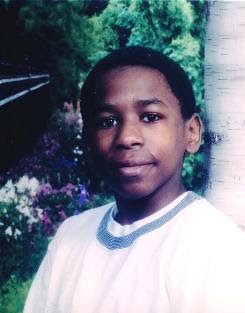Episodes

Sunday Jan 12, 2020
Positive Behavioral Interventions and Supports in Special Education
Sunday Jan 12, 2020
Sunday Jan 12, 2020

In memory of Cedric Napoleon
I wasn't going to write on this topic quite yet, but I'm working on a case right now that has me upset over public agency mismanagement and misconduct that has resulted in the physical abuse of our nonverbal student with severe special needs and God only knows how many other students within this public education agency. It reminded me of a lot of things, including our organization's founding and the protective purpose KPS4Parents has always served as student and family advocates.
I maintain my list of topics to write about as draft posts on the backend of our site, sometimes just as a title, sometimes with a brief description, as the ideas come to me and, when I go to write, I have them more or less organized in my head in the order I want to write them. But, sometimes, like now, something happens that makes one of the topics leap up to the top of the list.
I am currently providing paralegal support to an attorney on a case in which our student has gone for years without behavioral interventions in her IEPs after previous years of successfully benefitting from such IEP interventions. She has regressed to the point where she was behaviorally 10 years ago, before receiving any appropriate behavioral interventions at all.
The educational neglect in this case rises to the level of physical abuse. The school district's bumbling ineptitude at the expense of our student's welfare has been nothing short of galling. Our student is now sitting safely at home waiting for her case to be either adjudicated or settled but without the benefit of any instruction or related services until it's resolved.
Which takes me back to the founding of KPS4Parents and the event that was the last straw that compelled our founder, Nyanza Cook, to start KPS4Parents. In 2002, I was a lay advocate in private practice helping families of students with special needs, and Nyanza hired me to help her with her step-son's case, which is a story unto itself for another day. It's how we met and these were the early days. It was the context we were in at the time.
Nyanza hails from Killeen, Texas near Fort Hood, the largest U.S. Army base in the continental United States. While diversity has been tolerated, if not embraced, within the U.S. military in many instances, outside of the military base in the rural areas of Texas, diversity is not so much appreciated. Killeen Independent School District (KISD) has historically operated separate schools for students with "behavioral problems," most of whom have been African-American or Latino. The quality of special education in KISD has been historically abysmal, particularly for students of color, which is how it's misconduct led to our organization's founding.
In 2002, a young man named Cedric Napoleon was attending a Special Day Class (SDC) at one of KISD's special schools for students with "behavioral problems." Cedric was a foster child living with his foster mother, Toni Price. He had experienced severe trauma in early childhood, including deprivation of food for days that led to a food hoarding behavior and other behavioral challenges. He was in special education under the Emotional Disturbance (ED) category and his SDC was supposed to be configured specifically for students with ED issues.
Also in the classroom at the time was Nyanza's nephew. On one fateful day in March 2002, Cedric was suffocated to death by his classroom teacher during a prone restraint. He was not being violent towards others, trying to run out of the classroom, or hurting himself when she restrained him. He was being non-compliant and she took it as an affront to her authority. She pinned him face down on the floor out of hostile rage and when he said, "I can't breathe," she replied, "If you can speak, you can breathe." He expired shortly thereafter as Nyanza's nephew and his classmates watched on in horror.
That night, Nyanza got a hysterical phone call from family members gathered at her parents' house in Killeen. They knew she was talking about starting a special education advocacy organization and had been advocating for her step-son in California. They put her nephew on the phone with her and all he could say in a dazed voice was, "They killed him, Auntie. They killed him." He was terrified to return to school after that, and never did. His life has been one of despair and tragedy ever since.
The day Nyanza's nephew witnessed Cedric's murder in his classroom by his teacher, he was already there because he had his own ED issues. To add the trauma of witnessing Cedric's murder to his own pre-existing special education needs, in the place that was supposed to help him overcome his pre-existing special education needs and at the hands of the person who was supposed to help him, was just too much.
More than one life was destroyed that day. Cedric's classmates witnessed his murder in that ED SDC and were affected for life in ways that could only lead to more suffering for them. The District's students most vulnerable to trauma were severely traumatized by one of the most grotesque abuses of their trust possible. They witnessed their teacher kill a classmate for daring to defy her authority.
Nyanza called me that night as soon as she got off the phone with her family and told me what they had told her. She and I agreed that when teachers were murdering our babies in plain sight of our other babies (we have an it-takes-a-village mentality, which makes all babies our babies), we couldn't stand idly by. The death of Cedric Napoleon was the final straw that compelled Nyanza to go through with starting our organization, she asked for my help, I said "Yes!" without hesitation, and we had our paperwork in order by June of 2003.
In Cedric's case, to make matters worse, once his life had ended, so had his foster mother's legal authority to act on his behalf as a parent. She could not pursue justice for him because she lacked the legal authority and the foster care system did little to nothing about it. Cedric's killer was never tried for murder. She was never subject to any disciplinary action by the public education system in Texas.
On May 19, 2009, Toni Price finally got her chance to do something about what had happened to Cedric. The Education and Labor Committee of the U.S. House of Representatives was being presented with a report of the findings of an investigation the Committee had previously ordered to have done by the Government Accountability Office (GAO) regarding the use of seclusion and restraints in public schools. There had been a fairly recent similar study conducted of private schools that produced shocking and horrifying disclosures as bad as Cedric's or worse, and the Committee had wanted to know if these problems were also pervasive in our nation's public schools.
The GAO report started circulating among those in my professional circle online shortly after the hearings and ultimately found its way to me. I remember reading through it and getting to the section describing what happened to Cedric and going, "Wait a minute. I've heard this story before ... OMG! This is the kid from Nyanza's nephew's class!" I immediately forwarded the report to Nyanza and either called or texted her to follow up. At some point we ended up on the phone and she was flabbergasted to see Cedric's story spelled out in the report. It was the same student she had told me about back in 2002.
In the course of conducting its investigation, out of all of the cases of problems with seclusions and restraints that GAO examined, Cedric's stood out as particularly horrifying, in no small part due to the fact that his killer had never faced any serious consequences for killing him at the time of the investigation. The investigators searched for this teacher when their investigation revealed that she had faced no consequences and, shortly before the date of their presentation to the Committee, found that she had relocated to Virginia and was running an SDC on a public school campus that was only a 45-minute drive away from where the Committee was convening to hear the presentation of their report.
There was no effort to conceal the outrage that several Committee members expressed over the fact that this woman had not only killed an ED student in the ED SDC where she was supposed to be helping him get better, but that she faced no consequences and was able to get credentialed in at least one other state because the fact that she had killed a student didn't follow her on her record. They openly referred to Cedric's death as a murder.
The Committee's disgust is exposed during the hearing (click here for video of the full 2-hour hearing), and I share that disgust. It is disgusting; disgust is the only healthy response to what this woman did. Rep. Rob Andrews (1:22:22 - 1:28:16 of the hearing video), Rep. Lynn Woolsey (1:53:02 - 1:54:18 of the hearing video), and Rep. George Miller, Committee Chair (1:55:21 - 1:57:44 of the hearing video) had particularly candid things to say and there was bipartisan heartsickness over the whole thing.
The only reason Cedric's killer was found was because of the GAO's investigation. Had it not conducted it, a known killer would have been allowed to remain as a fox in a henhouse, circulating among the same types of individuals upon whom she had preyed before. Their parents had no idea they were sending their vulnerable children off to a child killer each school day. Even now, almost 11 years later, the thought still makes me shudder with horror.
The Committee's take on the situation was influenced in no small part by the testimony of various witnesses produced by the investigators in support of its findings. Among those asked to testify was Toni Price, Cedric's foster mother. Her testimony was compelling; even now, it still makes me cry.
Toni argued for a national, if not global, directory of teachers found guilty of child abuse for education agencies to use for screening teaching applicants, and she did so from the most informed position possible. She spoke as the primary caregiver of a child with mental health needs killed by the person entrusted to address them every day at school, but with no legal recourse to do anything about it, leaving advocating for that child and protecting others like him to no one. Only the fluke of a Congressional investigation at the right time on the right topic exposed what happened, and Toni took the opportunity to say what needed to be said.
Which brings me back to the topic of this post and podcast, which is the use of Positive Behavioral Interventions and Supports (PBIS) in special education. Subsequent to the May 2009 hearing, GAO began gathering additional information and the U.S. Department of Education began promulgating guidance and technical information regarding PBIS. In 2012, the U.S. Department of Education produced the Restraint and Seclusion Resource Document.
In February 2019, after 10 years of collecting data on the use of seclusion and restraints in our public schools, GAO produced another report and another hearing was held during which the last 10 years' worth of data collected and analyzed were presented to the Committee. Witnesses gave testimony, provided additional evidence, and answered questions. You now can look up the CRDC data for your own school district on the CRDC site.
Shortly thereafter, the U.S. Department of Education announced an initiative to address the inappropriate use of seclusions and restraints in our public schools. Just this last December, four members of the U.S. House of Representatives proposed a bill, HR 5325, referred to as the “Ending Punitive, Unfair, School-based Harm that is Overt and Unresponsive to Trauma Act of 2019” or the “Ending PUSHOUT Act of 2019," which seems like way too poor of a word choice for a name just to create an acronym, but the body of the bill still nonetheless prohibits seclusions and restraints and includes other regulations pertaining to behavioral interventions.
HR 5325 is still a bill pending before the Education and Labor Committee of the U.S. House of Representatives. It was introduced just last month, so obviously nothing has happened with it, yet. Congress has been a little busy lately and the last time the Committee tried to pass legislation to address seclusion and restraints in 2009, it passed in the House only to never see the light of day in the Senate. That's likely to happen again, now, with our current configuration of Congress, but the effort still needs to be made.
What GAO reported in the most recent hearing was that there wasn't enough data in, yet, regarding the efficacy of Education's efforts to promulgate PBIS technical information and guidance among the public schools or the degree to which the schools that availed themselves of it found it beneficial. In controlled research situations in which implementation fidelity was maintained, PBIS was proven to work, but how well public schools actually implement it with success in the absence of researcher oversight and fidelity checking remains to be seen.
What seems to be the case, and the whole reason this issue is before the House Education and Labor Committee, again, is that there is an obvious need for federal oversight and regulation, here. There is a lack of consistency from state to state as to how behavioral interventions are to be implemented in schools. Some states have regulations regarding seclusions and restraints in schools and others do not. Even those states that have laws in place don't provide for adequate enforcement of those laws.
The lack of built-in accountability has made it possible for horrible situations to happen. And, they continue to happen. The only way the public school system is held accountable in situations like these is when individual families take legal action. Hence, the case I'm now working on that has made these issues spring to life for me, once again, much to my deep disappointment.
Educator and support staff training, or a gross lack thereof, more specifically, is often at the heart of these cases. But, so is the lack of teacher accountability and the degree to which educators tend to cover up each other's tracks, even if it means a child dies in the process.
The fear of talking usually goes to fear of losing their jobs, fear of reprisals from their co-workers, fear of being held accountable for the actions of others, fear of getting in trouble for the same thing for which someone else is getting in trouble because they've done it, too, and has to come with a tremendous amount of internal conflict. Only sociopaths could smoothly walk that rocky landscape without being troubled by the experience.
The willingness of school administrators to let something as horrible as student traumatization, physical injury, and/or death by the hands of teaching staff and aides in the learning environment get swept under the rug and hope nobody notices, if not actively seek to conceal it, is repugnant. There is a lack of professional integrity in the public education system that can reach sickening proportions, and these cases are examples.
So, I really don't have an upbeat ending for this post and podcast. I'm pretty not okay with what I'm still seeing going on with respect to seclusion and restraints in public schools in California, which is supposed to be the most progressive state in the country. It's particularly bad in rural communities far away from specialists and adequate facilities, particularly when those communities are mostly made up of low-income households.
In some cases, like the one I'm working on now, the student has experienced nothing short of absolute barbarism. It shouldn't take people like me helping to hold the public education system accountable after the fact. The answer is prevention. In the absence of any guidance in the student's IEPs as to how to address her behaviors, she was repeatedly secluded and restrained by teachers and aides who didn't know what else to do.
This was all just up until a few weeks ago, which is why she's now safely at home but without any instruction or related services until her attorney, in collaboration with me as his paralegal and the experts we're bringing onto the team, can get this mess cleaned up. It just sickens my heart that after all the years that I've been doing this work - 29 years this coming June, mind you - this is where things are still at. In the most progressive state in the Union, we're still secluding and restraining non-verbal students who are struggling to communicate their wants and needs. It puts bile in the back of my throat.



Comments (0)
To leave or reply to comments, please download free Podbean or
No Comments
To leave or reply to comments,
please download free Podbean App.